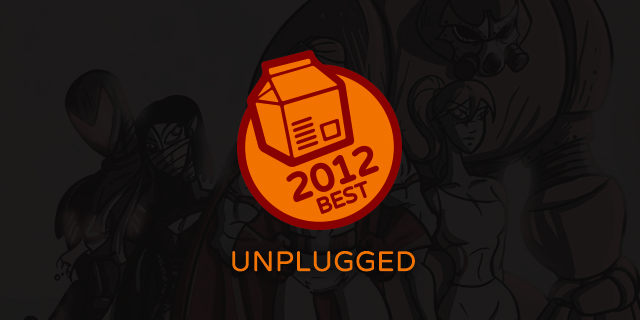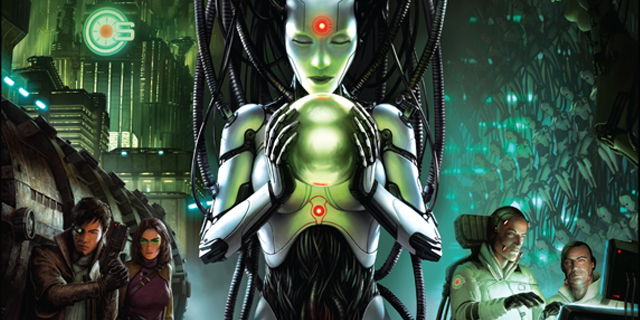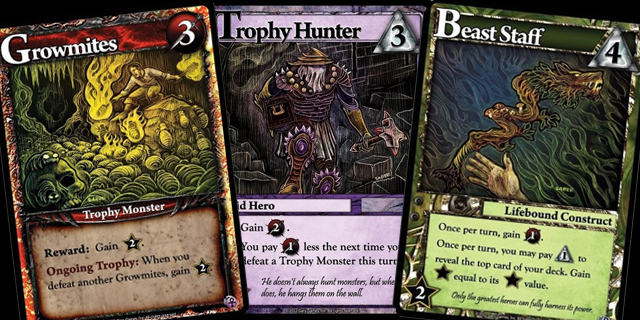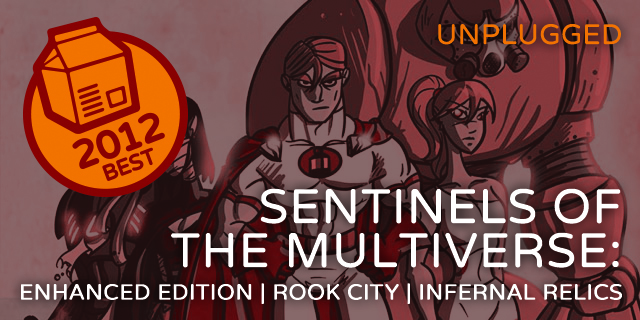
And so another great year of gaming draws to a close. 2012 was an important year at Snackbar Games, and for me personally as well. A couple months ago I hit the 100-column milestone here at Gaming Unplugged, and earlier this month the site itself observed its tenth anniversary; I’ve been on staff for seven of those years, and writing this column for the last four and a half (starting July 2007). It has certainly been an interesting ride, and it shows no sign of slowing any time soon.
I keep wondering how I will continue to find new topics to write about in this space, but the wealth of gaming just keeps giving. I have three or four boardgaming projects that I backed via Kickstarter that should start shipping in the early part of 2013 (one of which will actually pay off twice over the course of the year). I have also experienced several games this year that I have yet to cover, some new and some old — and that’s not even counting the ones I’ve played that didn’t impress me enough to discuss them (or were actively bad, but those are thankfully rare).
That said, if there is anything you would like to see me discuss here, please let me know and I’ll see what I can do. Being on staff here at Snackbar is basically the only reason I have a Twitter account, and I’d love to hear from readers either there or in comments.
And with that, on to my ten favorite new games of 2012!

…Actually, make that eleven. Because there is one game that I want to highlight again that couldn’t make my official list. I am, of course, speaking about the awesome X-Wing Miniatures game that I will never actually play myself. Seriously, if you aren’t as adverse to minis games as I am (it’s the dice… always the dice) then this one should be near or at the top of your list if you haven’t picked it up already.
Okay, now the real thing.
10: 7 Wonders: Cities/Leaders (column coming soon!). 7 Wonders: Leaders was released in 2011, but I felt it should be mentioned alongside 2012’s expansion, 7 Wonders: Cities, just for the sake of completion (and since I picked them up at the same time). 7 Wonders was my runner-up Game of the Year last year, and is basically perfect right out of the box. These expansions offer up some neat new possibilities, and I will probably always use them in future plays, but the base game really didn’t need the help.

9: Infiltration. The first of two games released this year to take the world concept introduced in Android and apply it to a new game set within that universe, Infiltration is a push-your-luck heist game that pits a team of thieves against a facility filled with traps and an incoming security team. The person who steals the most secret data wins… but only if they escape before the cops show up. Watching that proximity meter climb can be agonizing, and you will have to be able to anticipate your opponents’ actions if you want to make the most productive use of your ever-dwindling time. You may have entered as a team, but it is definitely “every man for himself” once that alarm goes off.
8: Divinare. How good are you at predicting the future and reading minds? While Divinare might not actually test those skills, it couldn’t hurt to have them in this simple game of bluffing and hand management. Passing cards to your neighbor gives you more information about what might be out there, but that won’t do you any good if you can’t get your prediction to land where you want thanks to the insidious requirement to change it whenever you play a card. This game may not look like much, but it will surprise you with its subtle strategies.
7: Village. Few games feature time as a resource like Village does, as just about everything you do will eventually cost you the “lives” of one of your meeples. In the long run, that’s usually a good thing as there are benefits to having your family’s ancestors immortalized in the village chronicle, but that doesn’t make it any less of a tragic event as you watch all of the effort invested in that meeple’s work vanish. I also like the strange action cube system that combines resource gathering with worker-placement in a unique manner.

6: Power Grid: The First Sparks. Everything I dislike about playing Power Grid goes away when I play The First Sparks. Streamlined, simplified, and with a great added sense of humor, The First Sparks is, in my eyes, justification for Power Grid even existing. If you played Power Grid and found it dry and/or too mathy, you should definitely give First Sparks a shot. If you haven’t, then please skip directly to this version and save yourself some time.
5: The Castles of Burgundy. Best dice game ever? Probably not, but that’s because I don’t really consider Castles of Burgundy to be a “dice game”. I like saying that in traditional dice games, the dice tell you what to do; in Castles, you tell the dice what to do. And that makes a world of difference. I never feel (completely) screwed by my rolls in Castles, as there are always ways to either make efficient use of your rolls or to outright change the result to the one you really needed. Sure, sometimes things still don’t work out quite the way you planned, but that always feels like a failing in actual strategy rather than in random probability.
4: Lords of Waterdeep. This blending of D&D theme with traditional worker-placement mechanics continues to impress my friends and I, making this a frequent star at both my weekly FLGS game night and weekend sessions at home. It scales well, it plays fast, and it is always fun. An expansion is due sometime in 2013, which should be interesting but (like 7 Wonders) not really necessary.

3: Ascension: Storm of Souls/Immortal Heroes. The new mechanics brought to the core Ascension gameplay by Storm of Souls (and further explored in Immortal Heroes) improved what was already a brilliant take on the deck-building genre by giving players more control over various effects and providing new avenues of strategy. The guys over at Stone Blade Entertainment (formerly Gary Games) have been busy working on their new IP lately, but I’m curious to see what, if anything we will see from them Ascension-wise in the coming year.
2: Android: Netrunner. One of the best-designed CCGs of all time is given new life by the LCG model (and a new skin by the Android universe), and I could not be happier. A masterful combination of asynchronous play, bluffing, and more traditional competitive card game elements, Netrunner is something that should be experienced by anyone who enjoys one-on-one strategy. Playing with the various preconstructed decks in the core set is more than enough value, but if you really want to explore everything Netrunner has to offer the first cycle of expansions should be arriving soon.

1: Sentinels of the Multiverse: Enhanced Edition/Rook City/Infernal Relics. Wow. Just… wow. How three guys (and a one-time guest designer on Infernal Relics) managed to pull off such an engaging cooperative game like Sentinels of the Multiverse is a testament to the passion they have for this project, and they have been rewarded for it time and again by their ever-growing fanbase. Every hero in Sentinels is unique, with their own play style, and every villain is a different challenge. Each possible combination of heroes, villains, and environment is an absolute blast as you team up with your friends to create your own insane superhero battles. Sometimes you win, sometimes you get your faces beat in, but you always want to come back for more.
And the team at Greater than Games keeps bringing more to the table, with one traditional expansion and one mega-expansion already on their way in 2013 after a ridiculously successful Kickstarter campaign. 2012 was a great year to be a fan of comic book superheroes at the movies (unless maybe you are a Green Lantern or Ghost Rider fan), but for me 2012 will be the Year of the Sentinels. And maybe 2013 will be as well.



















